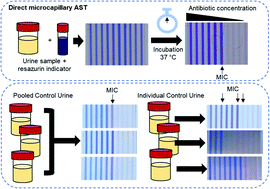Antimicrobial resistance is a global problem. One branch to help tackle AMR is innovation in rapid diagnostics. Currently, antimicrobial susceptibility tests (ASTs) are too slow (approx 2 days to results) so antibiotics are prescribed blindly. By developing rapid ASTs, clinicians will be able to prescribe only effective antibiotics, reducing the misuse of antibiotics and improving patient care.
Direct testing from samples, such as urine, can significantly reduce the time it takes to perform antimicrobial resistance tests, however, the sample matrix can interfere with the results leading to reduced accuracy.
In this work we look at the effect of different urine samples on traditional antimicrobial resistance tests and explore how the sample matrix can be overcome to produce accurate AST results directly from a urine sample. Using the microcapillary ASTs developed in Edwards lab allows us to study many more conditions than traditional testing.
The article is published open access in RSC Advances and can be accessed via this link:
https://pubs.rsc.org/en/content/articlelanding/2021/ra/d1ra06867a

